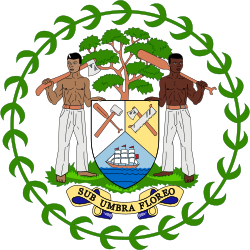| Division | Electorate | Turnout | % | Political party | Candidate | Votes | % |
|---|
| Albert | 2,424 | 2,058 | 84.9 | | People's United Party | Frederick Westby | | 42.8 |
| Christian Democratic Party | Nicholas Pollard | | 37.9 |
| National Independence Party | Floss Casasola | | 18.7 |
| Belize Rural North | 1,406 | 1,041 | 74.0 | | People's United Party | Fred Hunter | | 62.2 |
| Christian Democratic Party | Arthur Wade | | 25.4 |
| National Independence Party | Marcelo Casasola | | 10.3 |
| Belize Rural South | 1,052 | 781 | 74.2 | | People's United Party | Louis Sylvestre | | 81.3 |
| National Independence Party | Todd Brown | | 15.6 |
| Cayo North | 1,292 | 1,042 | 80.7 | | People's United Party | Hector Silva | | 70.5 |
| National Independence Party | Manuel Figueroa | | 27.0 |
| Cayo South | 1,174 | 962 | 81.9 | | People's United Party | Santiago Perdomo | | 61.3 |
| Christian Democratic Party | Eduardo Espat | | 30.0 |
| National Independence Party | Pedro Mena | | 5.8 |
| Collet | 2,706 | 2,168 | 80.1 | | People's United Party | Albert Cattouse | | 44.6 |
| National Independence Party | Edward Flowers | | 43.9 |
| Christian Democratic Party | Mervin Hulse | | 9.3 |
| Corozal North | 1,473 | 1,141 | 77.5 | | People's United Party | Santiago Ricalde | | 79.9 |
| National Independence Party | Gualberto Martinez | | 18.1 |
| Corozal South | 1,480 | 956 | 64.6 | | People's United Party | Jesus Ken | | 85.7 |
| National Independence Party | Victor Greenwood | | 10.5 |
| Fort George | 1,422 | 1,225 | 86.1 | | People's United Party | Alexander Hunter | | 60.2 |
| National Independence Party | Herbert Fuller | | 28.5 |
| Christian Democratic Party | Denbigh Jeffery | | 10.8 |
| Freetown | 1,850 | 1,625 | 87.8 | | People's United Party | George Cadle Price | | 67.1 |
| National Independence Party | Sabino Savery | | 24.8 |
| Christian Democratic Party | Erenst Cain | | 7.6 |
| Mesopotamia | 2,501 | 1,993 | 79.7 | | People's United Party | C. L. B. Rogers | | 62.4 |
| National Independence Party | Erlean Casasola | | 28.4 |
| Christian Democratic Party | Edward Usher | | 8.6 |
| Orange Walk North | 1,377 | 1,089 | 79.1 | | People's United Party | Victor Orellana | | 57.6 |
| National Independence Party | Eloy Escalante | | 40.7 |
| Orange Walk South | 926 | 680 | 73.4 | | People's United Party | Guadalupe Pech | | 81.4 |
| National Independence Party | Ignacio Vega | | 14.4 |
| Pickstock | 1,680 | 1,418 | 84.4 | | People's United Party | Gwendolyn Lizarraga | | 68.6 |
| National Independence Party | Jaime Staines | | 16.3 |
| Christian Democratic Party | Clare Gill | | 13.3 |
| Independent | Robert Taylor | | 0.7 |
| Independent | James Ysaguirre | | 0.4 |
| Stann Creek Rural | 1,856 | 1,343 | 72.4 | | People's United Party | David McKoy | | 72.3 |
| National Independence Party | Harry Stanley | | 23.7 |
| Stann Creek Town | 1,816 | 1,493 | 82.2 | | People's United Party | Allan Arthurs | | 52.3 |
| National Independence Party | Paul Guerrero | | 44.2 |
| Toledo North | 547 | 374 | 68.4 | | People's United Party | Faustino Zuniga | | 55.6 |
| National Independence Party | Charles Westby | | 42.2 |
| Toledo South | 941 | 732 | 77.8 | | People's United Party | Sam Vernon | | 48.0 |
| National Independence Party | Francis Martinez | | 39.5 |
| Christian Democratic Party | Alan Woodeye | | 11.5 |


